10 Things The Latest Science Tells Us About Caffeine and Athletes

Caffeine can help the performance of athletes, but only if it's used properly. (Photo: Patrick McDermott/Getty Images)
Whether it’s the latest high-performance running shoe, aero helmet, or biohack, athletes are seemingly always on the hunt for something that will give them an edge over the competition. While many methods fail to live up to the hype (ditching gluten being one good example), caffeine’s impact on the performance of athletes has held true, which is why it has become ubiquitous in the sporting world.
A huge research review published in the Journal of the International Society of Sports Nutrition and co-authored by online specialty tea and coffee company Cafely confirms that the right amount of caffeine can turn the tables on several measures of athletic performance. This includes improved aerobic and anaerobic endurance, movement velocity (such as the power production when pushing the pedals), muscular strength, coordination, and cognitive function. The study authors concluded that endurance athletes like triathletes appear to get the most consistent benefits from using the stimulant. And caffeine appears to improve physical performance in both trained and untrained individuals.
Caffeine works its magic through various mechanisms, but primarily as a central nervous system stimulant. In short, caffeine can crowd out a calming brain chemical called adenosine. The result is that you feel peppier when pounding the pavement or grinding up a big incline. It also appears to improve the force of muscle contraction, as well as reduce the perception of pain during exercise, which in turn makes a sufferfest feel easier. Taken beforehand, caffeine might also accelerate the rate of fat-burning during aerobic activity, which is not only good for your waistline but also helps conserve precious carbohydrate stores for improved endurance over the long haul. Of course, we cannot rule out a little bit of the good-old placebo effect. If we tell you that popping a caffeine capsule before a workout will make you fly it likely will help do just that without any physiological changes.
But getting the most out of using caffeine as an ergogenic aid requires more than just jogging up to a Starbucks and ordering a latte. Here are some important guidelines that should perk you up.
1. Know Your Dose
To effectively rev up your workouts and races you’ll need between 2 to 6 milligrams of caffeine per kilogram of body weight. In other words, 130 to 380 milligrams for a 140-pound runner to experience a 2 to 4% increase in endurance. Brewed coffee ranges from 60 to 180 milligrams in a 6-ounce serving. (Ounce for ounce espresso is more concentrated in caffeine than regular coffee.) Optimal doses will vary among individuals so it will require some trial and error. Start in the lower range of this dose recommendation during training periods and work up from there to find the level that gives you a boost without any unwanted side effects. Sensitivity to caffeine varies widely from one person to the next based on genetics. But know that no additional benefits have been born out in research above the upper threshold level. So more is not better.
If you feel overly jittery, anxious, or notice your heart pumping like a racehorse, dial back the amount of caffeine before you take before a workout. It’s never a good idea to take high amounts of caffeine before a big race without testing this out first during training.
Everyday coffee drinkers and frequent caffeine supplement users may need the higher end of this dosage range to experience a workout boost than those who normally aren’t exposed to the stimulant (more on this below). People with existing anxiety conditions, heart arrhythmias, high blood pressure, heart disease, or diabetes should consult with their doctor before beginning caffeine supplementation.
2. Scale Down
When it comes to reaping performance benefits, coffee lovers should consider sipping less leading up to a big event. A clever study in the journal PLOS One supplied healthy active adults who were typically light caffeine users, defined as consuming fewer than 50 milligrams per day which is less than the 100 to 350 milligrams in a cup of coffee, with a daily capsule containing 3 milligrams of caffeine per kilogram of body weight for 20 days. For a separate 20-day period the participants took a caffeine-free placebo. Before and after each study period and three times a week during the volunteers completed a VO2max test to exhaustion and a 15-second all-out sprint on an exercise bike. The results were telling: the moment people started taking caffeine, on day 1, they benefited from a roughly 5% boost in peak power compared to when using a placebo. But then after the first few days things started to taper off to the point where by day 11 the performance difference between the caffeine and no-caffeine trails became closer to even. The VO2max performance on day 20 in the caffeine trail looked pretty similar to that of day 6. This suggests that when we are not used to being perked up by caffeine and then all of a sudden get a shot of the stuff what transpires is a state of heightened caffeine sensitivity that can noticeably boost workouts. But with regular use there can be a habituation effect that dulls caffeine’s ergogenic benefits. Just like an alcoholic would need more booze to feel tipsy than a teetotaler.
So a pre-race caffeine detox of roughly 5 days might be a worthwhile strategy if you’re looking for a game-day caffeine hit to help you shave off seconds. The caveat being that the side-effects of going off caffeine such as migraines and mood swings in some people can put a damper on performance cancelling out the benefits of a putting it on the sidelines for a few days.
3. Think Beyond Coffee
Depending on the preparation method and bean variety, the caffeine content in a mug of java can vary greatly. The upshot is that you can never be sure exactly how much you’re getting. That’s why athletes may find it prudent to use caffeine-enhanced products like canned energy drinks, mints, gels, capsules, and ‘pre-workout’ formulas that provide a standardized dose. If you know that you require about 3 mg/kg body mass of caffeine to perk up your workout, it’s easier to figure out if you are getting enough when using caffeinated products then when relying solely on coffee with unknown amounts. To date, the majority of studies relating to caffeine and exercise performance has utilized powdered caffeine (in capsule form) for dose standardization and placebo creation.
4. Watch the Clock
Guzzling back a coffee or popping caffeinated gel on your way to the start line is not the best way to reap the full performance-boosting benefits of caffeine. The stimulant can take anywhere from 45 to 60 minutes to peak in your blood. So if you consume caffeine too close to a big run it will delay the time before you get the full effect. The result is that you want to plan ahead and consume your caffeine roughly 30 minutes to 1 hour before your workout so it can put extra zip in your stride from the get-go. For longer efforts like a triathlon which can last a number of hours, you can try taking your dose of caffeine before exercise and then an extra shot later on during the workout for an extra boost. During activity, caffeine can be especially beneficial where there has been an accumulation of exercise time and fatigue, meaning timing caffeine intake closer to a time of greater fatigue. This means you need not suck back a caffeinated gel 10 minutes into a marathon. A smaller dose of caffeine towards the latter parts of a long workout (say, from a flat cola) appears to be just as effective as taking a larger amount such as what would be consumed before an event. So caffeine could help you keep up the pace as fuel stores start to become depleted. But like everything with caffeine there will be some individual variability.
The source of the caffeine can also impact optimal timing. For example, the caffeine from a chewing gum can get into your system quicker than the caffeine from brewed coffee or an energy bar and, in turn, may require a shorter waiting time between consumption and exercise. Again, it’s all about experimenting with products, dosages, and timing during training to see what works best for you.
Another thing to consider is when you’ll be working up a sweat. If your exercise occurs at night you may want to shelve the caffeinated chews. A European Journal of Applied Physiology study found that athletes who used caffeine for performance benefits during evening exercise also experienced significant sleep disturbances such as delayed onset of sleep. And this certainly can negatively impact fitness gains and health. Though it varies among individuals, caffeine generally has a half-life of four to six hours. So unlike the sugars in sports drinks and gels, it continues to energize long after consumption which could upset your pillow time.
5. Not All Athletes Benefit from Caffeine
There is a reason why the performance benefits of caffeine for athletes are not universal in research. And it comes down to a caffeine-gene interaction. The vast majority of caffeine is metabolized in the body by the CYP1A2 enzyme, which is influenced by our genes. Those with a certain genotype for this enzyme will experience a benefit, while those with a different genotype will not get a performance boost. (There is even one genotype where caffeine can impair exercise performance.) A CYPIA2 genotype that makes a person a “fast” caffeine metabolizer appears to be the key to better performance than a “slow” metabolizer genotype. Presently, only a genetic test can tell you what genotype you are, which is not yet accessible to most athletes, but you should be able to see for yourself if using caffeine gives you a noticeable push.
6. Check the Temperature
If the weather forecast suggests you are about to work out in the blazing heat it might be a good idea to reconsider jazzing up on caffeine. A new study in the journal Medicine and Science in Sports and Exercise showed that young active men who were given 5 mg of caffeine per kilogram of body weight one hour before performing 45 minutes of moderate-intensity cycling in a sultry 37°C (99°F) experienced higher rates of hyperthermia-induced hyperventilation and a greater reduction in brain flow than when they exercised in the heat without supplementing with caffeine. This suggests that caffeine may impair how well thermoregulation works during exercise in very hot conditions which could lead to concerning conditions like confusion, light-headiness, and premature exhaustion. Fingers crossed this experiment is repeated in female and older athletes to see if caffeine also disrupts thermoregulatory mechanisms in these populations.
7. Coffee Is Good For You, Within Reason
It doesn’t exactly have much of a health cache, but the brew so many of us can’t imagine doing without does seem to deliver some benefits beyond getting you to the finish line. For instance, drinking one to three cups of black caffeinated coffee a day may reduce the risk of heart failure by 5 to 12% per cup, according to an analysis of three studies by the American Heart Association, published in Circulation: Heart Failure. Drinking decaffeinated coffee did not have the same benefit. This is an intriguing finding considering that most people think coffee is bad for the ticker owing to its association with potential side-effects like palpitations. A report in the Journal of Nutrition found that espresso-loving Italians who consumed 3 to 4 cups of Italian-style coffee (read: not white chocolate mocha) had a lower risk for mortality than those who consume little or none. Further, research published in BMJ Open showed people who drank two or more cups of coffee per day had a 9% lower risk of developing prostate cancer than those who consumed fewer than two cups or none per day. And the British Medical Journal found a link between coffee and a lower risk for some cancers, as well as for cardiovascular disease and death from any cause.
There might be some sort of interaction between the caffeine and bioactive compounds in coffee including chlorogenic acids that can help fortify health. Or it could come down to moderate coffee drinkers having an overall healthier lifestyle including more exercise and better eating. (It’s not possible from epidemiological nutrition research to prove that drinking coffee directly prevents heart attacks and other diseases. What we have is an association, not causation.) It should be stressed, however, that we should not apply these results to other caffeinated products like sugary energy drinks and soda.
But when it comes to coffee it might be a case of diminishing returns. This recent study found that among 362,571 adults who drink six or more cups of coffee per day over the long term had higher amount of lipids in their blood associated with higher risk of heart disease compared with those who drank more moderate amounts. An expansive report in the New England Journal of Medicine said having two to five cups of coffee each day has been linked to reduced risk of some chronic diseases, but taking in caffeine beyond this point may have consequences such as anxiety, insomnia, or psychomotor agitation. It was recommended that most people limit caffeine intake to 400 milligrams daily, which is about double what the typical American consumes in a day. Interestingly, this study suggests drinking large amounts of unfiltered styles of coffee including French press and espresso (9 cups or more a day) might be more harmful than consuming filtered brew such as drip coffee through a paper filter. Filters help remove certain compounds in coffee such as diterpenes which may raise cholesterol numbers with high intakes.
Remember to also count caffeine in foods like dark chocolate and other drinks including tea. Also, if you douse your java with sugar or calorie-dense creams it will likely cancel out some of the health benefits.
8. Go Easy if Pregnant
Not every athlete should be relying on caffeine for a better effort. Female athletes who are expecting may want to consider rethinking their espresso habit or caffeine supplementation use. An analysis of observational studies published in BMJ Evidence Based Medicine found that consistent caffeine intake during those nine months can increase the risk of adverse pregnancy outcomes including miscarriage, stillbirth, and low birth weight. A dose-response association between caffeine intake and pregnancy outcomes was found but even small amounts were considered problematic in some research. Currently, many health guidelines for caffeine consumption in pregnant women call for no more than a moderate intake of 200 milligrams, or about two cups of coffee, per day. But this report suggests pregnant women may want to shot for even lower intake levels, which means keeping that caffeine-spiked gum in its package.
9. No, Caffeine Doesn’t Dehydrate Athletes
It’s a myth that caffeine acts as a diuretic thereby raising the risk for dehydration during exercise. That’s because during exercise blood is diverted to working muscles so the kidneys don’t receive their normal blood flow meaning less urine overall is produced. The upshot is that you don’t need to be any more diligent about fluid intake to avoid performance-sapping dehydration during a bike ride or run if you have supplemented with caffeine.
10. Bring it to the After Party
Not only can pre-workout caffeine give you an edge it may also help you recoup afterward. A Journal of Applied Physiology study reported that when subjects combined carbohydrates with caffeine following exercise they accumulated 66 percent more muscle glycogen–the main fuel for hard-charging muscles–than when only carbohydrates were consumed. Coffee smoothie, anyone? But only try this if you’ll be taking in caffeine not too late in the day to avoid tossing and turning at night.
RELATED: Instant Coffee Doesn’t Have to Suck
Our Favorite Caffeine Choices for Athletes
These caffeine-infused products can help start your engines.
Caffeine Bullet Chews
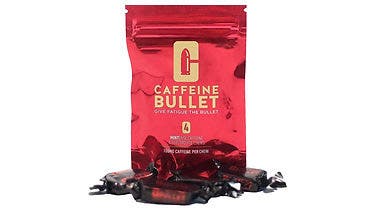
Each chocolaty chews delivers a 100mg caffeine punch. The mastication activity in your mouth can increase the caffeine’s absorption rate for a quicker benefit. This also means you can pop one closer to exercise as the caffeine will kick in faster.
Quantum Squares
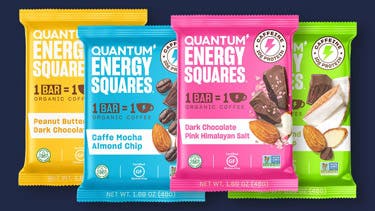
With each tender square supplying the caffeine equivalent of a cup of coffee these are the literal energy bars.
Gu Espresso Love
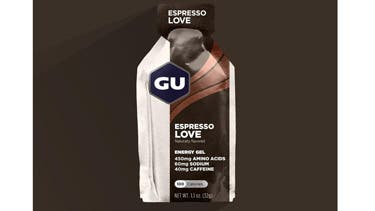
The combo of quick-digesting carbs and 40mg of caffeine in this gel will help you stay strong to the end.
Eboost Pre-Workout Powder
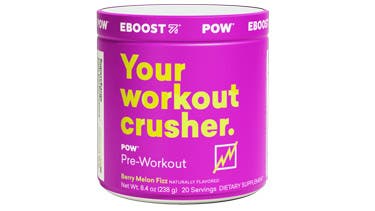
Dissolve this next-level powder containing 175mg caffeine and other goodies like beet root and L-theanine in your water before lacing up the shoes for an extra push.
Probar Bolt
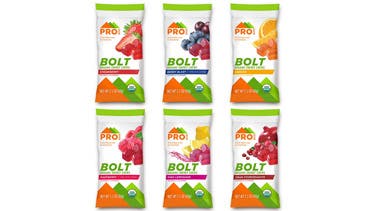
Made with a delicious organic fruit flavor and yerba mate extract for a hit of caffeine, these chews are easy to pop when you are going hard and starting to feel beaten down.
Chameleon Cold Brew Coffee
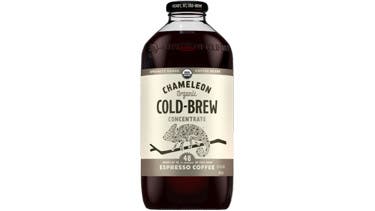
When cold water is used to steep coffee grounds less acid is released, so it can be gentler on your digestive system if coffee typically bothers you. Also, the longer brewing time and higher grounds-to-water ratio can give the cool brew more of a caffeine jolt per ounce than a regular cup of Joe. Both dairy and dairy-free options are available.
Boon Espresso Bean Almond Butter
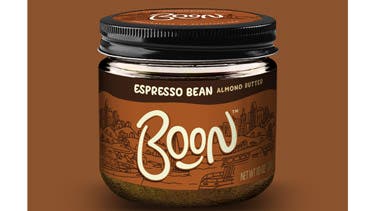
This nut butter may not have enough caffeine for a performance impact, but who cares. The ground up beans add bold flavor to this no added sugar nutty spread making it a delicious way to upgrade your pre-workout toast.